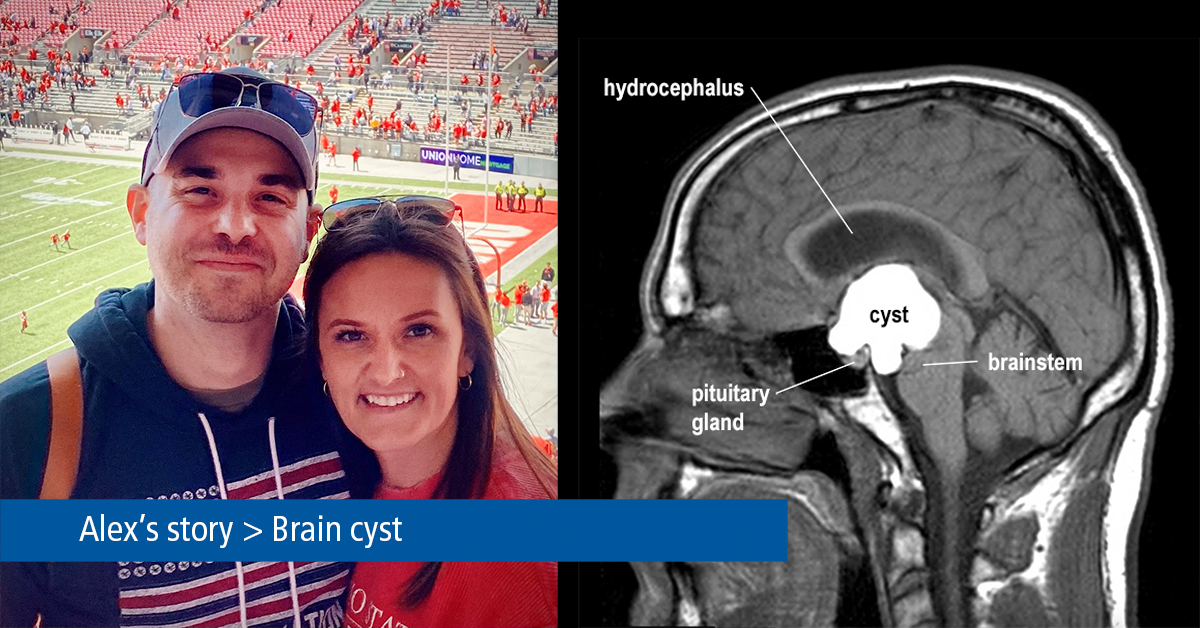Brain Tumor Care > Pituitary tumors
Tumors that grow from the pituitary gland can affect the whole body by interfering with normal hormone levels. They can also cause headaches and vision problems. Mayfield's pituitary experts are skilled at treating these deep, hard to reach tumors. We offer minimally invasive endoscopic surgery, radiosurgery, and skull base surgery. Treatment aims to remove the tumor or control its growth, preserve vision, and correct hormone levels to normal.
We discuss all pituitary cases with your hospital's brain tumor board. The team includes neurosurgeons, ENT surgeons, radiation oncologists, endocrinologists, and rehabilitation specialists. Together, we share our opinions and then synthesize them into a personalized treatment plan for you.
About pituitary tumors
There are various kinds of pituitary tumors: adenomas, craniopharyngiomas, and Rathke's cleft cysts. Most are benign (not cancer) and are often curable. Functioning pituitary tumors secrete high levels of hormones (prolactinoma, growth hormone, Cushing's). Other pituitary tumors do not secrete hormones. Instead, they grow until their size cause headache and vision loss by pressing on the optic nerves or invading the cavernous sinuses.
Learn more:
In the past 5 years, Mayfield has seen 1,286 patients with pituitary tumors and performed 174 procedures — making Mayfield a leading treatment program.1,2 In context, one third of people newly diagnosed with a pituitary tumor in Ohio3 seek care at Mayfield, many of which are observed.

The goals of treatment are to remove or halt the growth of the tumor while preserving vision (optic nerve) and hormone function. Symptom resolution is highly dependent on tumor size, if it invades the nearby cavernous sinus, and if it secretes hormones. Consistent with the literature4, Mayfield's patients have 90% resolution of their symptoms and 92% have improved or full activity level.
Mayfield participates in meaningful large-scale clinical studies by working with national research consortiums including the International Radiosurgery Research Foundation (IRRF) and the NeuroPoint Quality Outcomes Database (QOD). These efforts establish benchmarks and generates data to improve the quality of care for all brain tumor patients.

- Maragkos GA … Warnick RE, et al. Silent Corticotroph Staining Pituitary Neuroendocrine Tumors: Prognostic Significance in Radiosurgery. Neurosurgery. 2023 Dec 1;93(6):1407-1414.
- Patel A, Gozal YM, et al. Spontaneous Cerebrospinal Fluid Rhinorrhea from a Prolactin-Secreting Pituitary Macroadenoma. Cureus. 2021 Feb 3;13(2):e13111.
- Pomeraniec IJ … Warnick RE, et al.. Dose to neuroanatomical structures surrounding pituitary adenomas and the effect of stereotactic radiosurgery on neuroendocrine function: an international multicenter study. J Neurosurg. 2021 Sep 24;136(3):813-821.
- Horowitz PM, DiNapoli V, et al. Complication Avoidance in Endoscopic Skull Base Surgery. Otolaryngol Clin North Am. 2016 Feb;49(1):227-35.
- Darakchiev BJ, Bohinski RJ, Warnick RE, et al. Adaptation of a standard low-field (0.3-T) system to the operating room: focus on pituitary adenomas. Neurosurg Clin N Am. 2005 Jan;16(1):155-64.

 513-221-1100
513-221-1100







